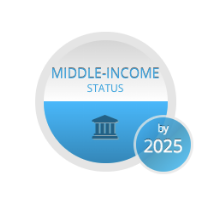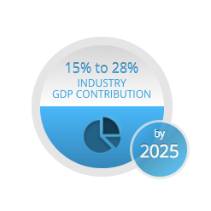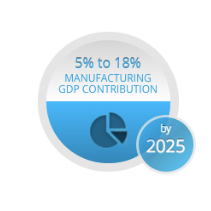2021
16 Jun 2021
Inauguration of Ethiopia's first Coffee Training Center as part of the PCP’s focus on the agro-processing sector.
15 Jun 2021
UNIDO, China and Ethiopia launch a project on upgrading the livestock value chain as part of the PCP.
15 Jun 2021
18 May 2021
Ethiopia's Prime Minister Abiy Ahmed inaugurates the third Integrated Agro-Industrial Park established as part of PCP Ethiopia.
1 May 2021
Inauguration of the first Creative Hub in Ethiopia to support creative industries and entrepreneurship as part of the PCP’s focus on leather and leather products.
1 May 2021
13 Mar 2021
Prime Minister Abiy Ahmed inaugurates the Yirgalem Integrated Agro-Industrial Park (Sidama State) established as part of PCP Ethiopia.
7 Feb 2021
Prime Minister Abiy Ahmed inaugurates the Bure Integrated Agro-Industrial Park (Amhara State) established as part of PCP Ethiopia.
7 Feb 2021
2 Feb 2021
Government of Ethiopia shares its PCP experience and lessons learned as part of a PCP peer learning session organized by UNIDO.
2019
17 Jul 2019
China's South-South Cooperation Assistance Fund supports PCP Ethiopia's livestock value chain development project.
17 Jul 2019
Introducing Ethiopia
Ethiopia is a federal democratic republic with nine states and two city administrations. With an estimated population of 94 million, it is the second most populous country in Africa. It is also one of the continent's fastest growing economies. The country’s gross domestic product (GDP) was USD 46.87 billion in 2013, with a growth rate of 10.4 per cent the same year and an average growth rate of 10.9 per cent since 2004. The rate of growth is projected to average 7.3 per cent from 2015 to 2018.
Economic growth is primarily driven by government-led development policies, with a rapid expansion of public infrastructure and basic services. Increasing exports and foreign direct investment have also fuelled growth.
Agriculture remains central to the country’s structural transformation and poverty reduction efforts. The agricultural sector contributes 44 per cent of GDP, while industry’s share remains relatively small, accounting for 13 per cent of GDP. The manufacturing subsector amounts to four per cent of the overall GDP.
National development targets



PCP ETHIOPIA
A unique opportunity to boost the economy
UNIDO has been actively involved in Ethiopia since 1968, with nearly 300 projects covering a wide range of technical assistance interventions, such as vocational training, cluster building and value chain development. In addition, between 1999 and 2008, UNIDO implemented two phases of its Integrated Programme for Ethiopia.
The Programme for Country Partnership (PCP) for Ethiopia brings together development partners, UN agencies, financial institutions and the business sector ─ under the leadership of the national Government ─ to help achieve the goals set out in the country’s industrial development strategy and Growth and Transformation Plan II (GTP II, 2015-2020).
The PCP focuses on three light manufacturing sectors: agro-food processing; textiles and apparel; and leather and leather products. These sectors were chosen due to their prospects for job creation, strong linkages to the agricultural sector, high export potential and capacities to attract private sector investment. They will act as a springboard for the transformation of Ethiopia's economy from one based on agriculture, to one driven primarily by light industries.
UNIDO has a technical team dedicated to executing the PCP at its Vienna headquarters.
Ethiopia: moving towards inclusive and sustainable industrial development (2014) Play video
Today's landscape
Ethiopia is endowed with a good climate, abundant arable land, adequate rainfall and a range of ecological zones. Developing land for increased agricultural output, however, requires significant investment in infrastructure, such as roads and electricity. Moreover, the agricultural sector is dominated by smallholder farmers, making it difficult to organize raw material supply for agro-industries. As a result, many of the food processors are operating below their maximum capacity.
Agribusiness development is crucial for sustaining Ethiopia’s economic growth. Agro-industries account for the largest share of the country’s manufactured goods, with food and beverages constituting approximately 52 per cent. An improved investment climate alone, however, has not been sufficient to attract investors to the agro-processing sector in places where there is high economic potential. This is mainly due to the lack of proper infrastructure and inadequate supply of raw materials.
Outlook
UNIDO is working with the Government of Ethiopia to establish four Integrated Agro-Industrial Parks (IAIPs). The IAIPs will focus on adding value to locally sourced agricultural products and will address constraints for private sector development. The parks will provide large- and medium-scale firms with industrial land, access to infrastructure and utilities, as well as business services. At the same time, they will serve as a platform for catalyzing investment and job creation.
Rural Transformation Centres (RTCs) will also be set up around each IAIP. They will serve as aggregation points with a modern warehouse and market facilities, where private sector investment can promote key input markets, such as fertilizers and hybrid seeds, and where farmers can sell their produce.
Today's landscape
Ethiopia grows some of the world's finest cotton and has a rich spinning and weaving history. An abundance of raw materials, low energy costs and a vast labour force provide Ethiopia with a comparative advantage over other countries. Presently, more than 230 large and medium-scale factories and 11,800 small-scale enterprises operate in the sector.
The country has also attracted significant international buyers and investors in recent years. A number of foreign garment companies, such as Wal-Mart (United States), Jiang Lianfa Textile (China) and H&M (Sweden), have invested and registered in Ethiopia. Total investment in the textile sector exceeded USD 1.2 billion over the past five years, and created over 50,000 jobs.
However, like the agro-food processing sector, raw material shortages are one of the main challenges faced by Ethiopian textile and clothing industries. Production and supply chain inefficiencies along the cotton-to-textile value chain also constrain the country’s ability to compete at the global level.
Outlook
Together with its partners, UNIDO will support the Government of Ethiopia and the private sector in its efforts to increase the supply of quality raw materials, upgrade workforce skills, build the capacity of support institutions along the value chain, and improve trade logistics. The PCP will also promote investment opportunities in integrated textile mills.
Today's landscape
Ethiopia's leather sector enjoys significant international comparative advantages owing to its abundant raw materials, highly skilled workforce and low costs. Ethiopia has one of the world’s largest livestock populations with 52 million cattle (first in Africa and sixth in the world), 27 million sheep (third in Africa and tenth in the world) and 23 million goats (third in Africa and eighth in the world).
During the fiscal year 2012/13, over 68.33 million square meters of leather were processed into footwear for both domestic and international markets, contributing roughly 44 per cent to the manufacturing sector. The leather industry currently employs approximately 14,000 people.
However, the leather industry remains constrained by a shortage of hides and skins, out-dated equipment, insufficiently skilled labour, low capacity utilization (tanneries operate below 50 per cent of their installed capacities), and the lack of price incentives for superior quality goods.
Outlook
The PCP is supporting the Government of Ethiopia in the establishment of a leather industry cluster on the basis of an existing concentration of tanneries in the town of Modjo. UNIDO is finalizing a feasibility study on the founding of the Modjo Leather City and will support the Government in mobilizing resources for its establishment.
The PCP will also help set up four footwear and leather goods clusters, and strengthen the fashion design and training capabilities of the Leather Industry Development Institute (LIDI).
Today's landscape
Industrial zones provide enterprises with basic infrastructure - roads, energy, water, sewerage, telecom services - and inexpensive land. They also act as a catalyst for private investment and provide an opportunity to link local small-scale suppliers to resident manufacturers, allowing local firms to further integrate into global value chains. Indeed, many multinational companies have relocated their factories to Ethiopia given the country’s low labour costs and eligibility under the Africa Growth and Opportunity Act (AGOA) for duty-free exports to the United States.
The first government-run, large-scale industrial zone - the 156-hectare Bole Lemi Industrial Zone - was designed to attract export-oriented agro-processors, pharmaceutical companies and textile manufacturers. It currently hosts textiles and leather products manufacturers.
Outlook
The Government is planning to develop four additional industrial zones in Dire Dawa, Kombolcha and Hawasa, expand the Bole Lemi Industrial Zone and provide support to several industrial parks developed by the private sector.
UNIDO will work with PCP partners to prepare feasibility studies, mobilize capital, promote investment, and link small and medium-sized enterprises to larger companies operating in the industrial zones. The Organization will also help improve services rendered by support institutions and cooperate with its partners to ensure that infrastructure projects are aligned with potential economic growth corridors.
Today's landscape
With Ethiopia’s rapidly expanding economy and increasing orientation towards international markets, the country aspires to join the World Trade Organization. To do so, the national quality infrastructure needs to have the capacity to deliver quality assurance services according to international trade-related standards.
In order to optimize the development of light industries in Ethiopia, inefficiencies in trade logistics also need to be addressed. These include high freight-handling costs, high costs of financial services, long delays in the authorization of letters of credit, as well as complex customs procedures and high customs costs.
Outlook
The PCP will help national quality assurance-related institutions to develop and apply quality standards and certification schemes in conformity with international market requirements, in particular for industrial zones. UNIDO will also work with its PCP partners to set up a trade knowledge centre to provide information on import-export procedures, tariffs, and best practices in logistics operations. This will help to reduce information asymmetries among public institutions, businesses and investors.
An analysis of the current institutional responsibilities and regulatory powers will be conducted to identify redundancies and improve ineffective procedures in public institutions. Public officials will also benefit from training courses on trade facilitation.
Today's landscape
Industrial parks are major consumers of energy and require an uninterrupted supply. However, for industrial parks located in isolated areas, energy access is constrained by limited infrastructure and an unreliable power supply. This not only leads to lost production time, but also higher input costs if energy is not consumed efficiently.
While Ethiopia ranks as Africa’s largest meat producer, an estimated 300,000 tons of animal by-products are dumped annually in open fields. Apart from the loss of valuable economic resources, such volumes of waste create an environmental problem.
Outlook
With this in view, the PCP will promote the use of locally available renewable energy resources, such as bio-waste or small hydropower stations, to power industrial park operations. A more systematic approach to energy efficiency is expected to lead to substantial energy savings and increased industrial productivity.
The PCP will also help the Government to develop industrial complexes with higher environmental standards and improved waste management systems. In addition, UNIDO, together with its PCP partners, will set up a rendering industry to generate semi-products for the downstream manufacture of a variety of industrial and food products, initially targeting seven export-oriented slaughterhouses.
Today's landscape
Strong national institutions are essential for Ethiopia to achieve its national development goals and capitalize on the large investment flows coming into the country. The Government has recently established a number of new institutions to support the industrialization process, in addition to upgrading existing ones. However, challenges remain in terms of coordination between the various institutions, as well as limited human resource capacity for addressing strategic and structural issues within the institutions themselves. In addition, there is limited national industrial data to support policy design and implementation.
Outlook
In order to address some of these institutional challenges, UNIDO ─ in collaboration with its PCP partners ─ will strengthen the capacity of the Ministry of Industry to generate industrial intelligence, in particular for agro-industries. It will also support the establishment of an industrial observatory to centralize all industry-related data, alongside an effective monitoring and evaluation system. The PCP will also help the Government to institutionalize South-South and Triangular Industrial Cooperation.
PARTNERS
The African Development Bank (AfDB), European Investment Bank (EIB), European Union (EU), Food and Agriculture Organization of the United Nations (FAO), International Fund for Agricultural Development (IFAD), International Finance Corporation (IFC), United Nations Development Programme (UNDP), World Bank (WB), as well as China and Italy are among the key development partners operating in Ethiopia. Development partners provide support through short- and medium-term interventions to upgrade infrastructure, increase agricultural productivity, generate youth employment, and develop the financial services sector. The various programmes and projects are aligned with the Government’s Growth and Transformation Plan.
